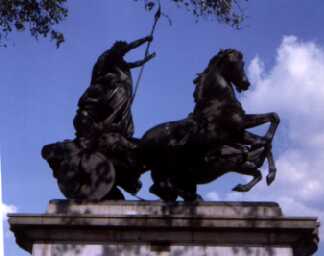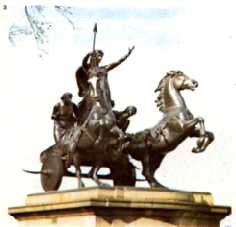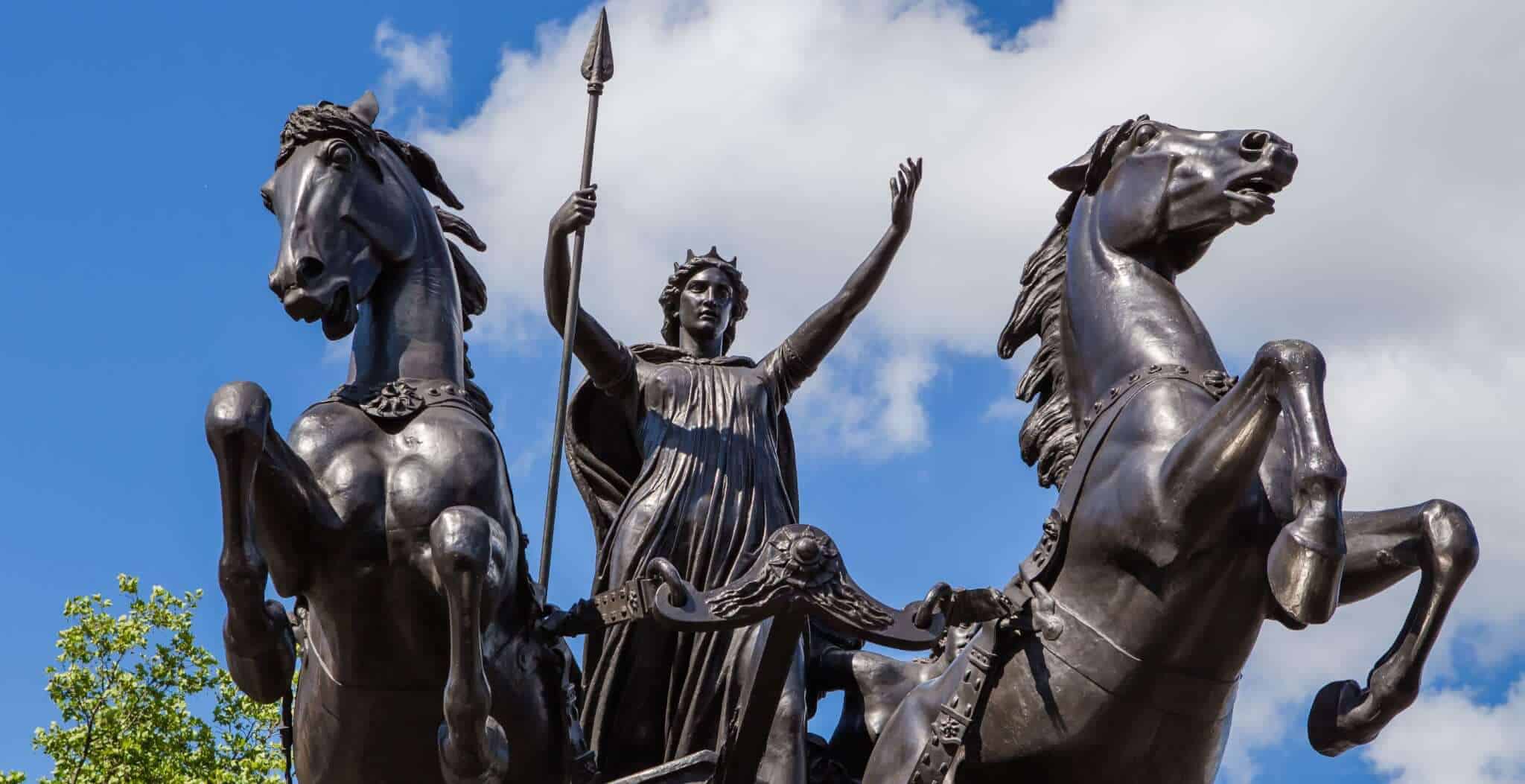Queen Boudicca of the Iceni
Early British Celt leader r. c59-61 AD
Born: c20 AD
Died: 61 AD
Father: Antedios d. c25 r. c25
Mother: ?
Spouse: Marius or Prasutagus
Children:
2 teenage daughters, 1 m. Marius (MBKQ A33 P76 Silures, mother of Coel I A35 P77)
others?
2 views of London's Boudicca statue on bank of Thames beside Parliament ===>> |

from Ancient Rome, Nigel Rodgers,
Hermes House [Anness Pub Ltd],
2006, own, 512pp, p58 |

another view, from
Illustrated Reference
Book of Ancient History,
ed. James Mitchell,
Windward (W H Smith),
1982, Mustang, p74 |
See also stylized image of statue in Battlefield Britain, father/son authors
- c7150 BC: Cheddar Man
- c3000 BC: "small, dark, long-headed Neolithic invaders arrive from Mediterranean, great monument: stone-circle at Avebury in Wiltshire" (3-4)
- c1900 BC: "round-headed Bronze-Age people, originally from Rhineland, arrive ... stronger, larger race than Neolithic man, though still dark and swarthy aka Beaker People, made tools of Bronze, built Stonehenge" (4, whence Silures, "swarthy and curly haired" 9)
- c1000 BC: "Iron Age Celts, still more powerful, mined iron ore, chariots, tall, fair-skinned w/red or blond hair and blue or green eyes (e.g. whence Boudicca)
- 55 BC: Caesar's 1rst British expedition, inconclusive
- 54 BC: Caesar's 2nd British invasion, more successful
"Under the ensuing peace treaty the British tribes were meant to send tribute to Rome once a year, but the invasion ended inconclusively when Caesar had to dash back to Gaul to stamp out a rebellion. Caesar might [claim victory] ... but unlike when the real conquest of Britain took place under the Emperor Claudius 90yrs later he left no garrisons behind ... [The brits main problem is they couldn't unite; Though nominally united under Cassivellaunus, once the Trinovantes sought a separate peace w/Rome, he also] decided it was wiser to make terms w/Caesar ... hardly onerous ... Britons under their kings and chiefs were free to carry on the existence of their ancestors, but very subtly and slowly their lives were changing [by increasing contact w/Rome]" (tSoB pp6-7).
"The most important of these [brit] kingdoms were those ruled by the descendants of Cassivellaunus, whose tribe the Catuvellauni had massively extended their territories since Caesar's departure [probably using techniques they had learned from the Romans] ... By the beginning of the 1C AD they were ruled by King Cunobelinus (Shakespeare's Cymbeline) ... It was because of a row between Cunobelinus and his son Adminius that the far-off and still mysterious country of Britain once more came to the attention of the authorities in Rome. For Prince Adminius, who had been banished by his father, fled to Rome and the court of the Emperor Caligula ... [who soon] began preparations for a new invasion ... [which came to nothing] but 9yrs later, in AD 43, Caligula's preparations were taken up when his cousin, the eccentric but energetic new emperor Claudius, needed a military conquest to secure his shaky throne. It was under Claudius that the subduing of Britain began in earnest, as it was turned into a Roman province held by military garrisons in forts erected systematically across the country. This time the Roman invaders - 4 legions consisting of 20K soldiers plus 20K auxiliaries - would occupy the country up to Scotland and stay for 4 centuries. After his military commander Aulus Plautius had defeated the Britons ... Claudius arrived [to celebrate his victory] ... However, despite the formidable superiority of the Roman invaders, some hope remained among many Britons of re-establishing their independence and throwing the Romans off their island. The extent of the British tribes' obsession with personal liberty would impress and amaze the sober Romans, who had to crush their many rebellions. But their spirited bravery was not enough. What [hurt them most] was the tribes' fatal habit of treachery [i.e. failure to maintain a unified front against the Romans] ... Their universal tendency was to make separate treaties w/Rome and then to turn on one another ... Claudius was careful to establish good relations w/many British kings and queens [hmm, including having his daughter Genvissa m. Arviragus?] ... Nevertheless, for 9 long yrs under another of Cunobelinus' sons, the chieftain Caractacus [of the Silures], a dangerous British patriotic resistance continued in the W on the borders of Wales ... fame spread as far as Italy, where it was considered extraordinary that a barbarian chieftain could defy imperial Rome ... waged an early kind of guerrilla warfare ... In words which would win the admiration of Romans and confirm their view of the central importance of liberty to the British character, Caractacus told his men that there was no point in living if [that meant] a miserable existence spent in hiding: they must win their freedom back or they'd be enslaved for ever ['give me liberty or give me death'] ... [in the face of Roman superiority] Caractacus fled and threw himself on the mercy of Queen Cartimandua of the Brigandes ... [who] shipped him off to Rome w/his wife and children. There he continued to impress the Romans by his unbreakable spirit. Unlike other captives who marched past the emperor howling for mercy, Caractacus maintained a proud and resolute bearing undiminished by his haggard appearance ... [his speech before Claudius convinced the latter to set him and family free in Rome]" (tSoB pp7-10).
But while Claudius treated "friendly British tribes w/ceremony and respect," most Romans lacked that "diplomatic touch" (10). "The first Roman governor of Britain, Ostorius Scapula" humiliated the Britons by treated them like slaves. "When Ostorius died of exhaustion from battling the Silures, his militaristic successor Seutonius Paulinus [was no better a diplomat] ... By AD 61 relations between the Romans and the British tribes were already in a bad way. It was particularly bad NE of London around Colchester and in Norfolk where the Trinovantes' neighbors the Iceni tribe had still more to anger them. Their dying king Pratusagus had tried to ensure that his wife Queen Boudicca was protected from the bad treatment being meted out to the Britons by making Rome co-heir to his kingdom w/his 2 daughters. Instead of being satisfied by this the local military commander (name?) had flogged the beautiful red-haired queen w/rods and raped her 2 teenage daughters. The Romans then destroyed her houses and [stole] her household treasures ... Finally, he expelled her and the Iceni from their lands, which the Romans at once subjected to an orgy of destruction ... While Paulinus and his soldiers were in Wales [preparing to attack] Anglesey, in Essex Queen Boudicca had gathered an army of 120K men, 3x the strength of the Roman legions in Britain ... routed the 9th Legion [at Colchester, then] put London to the torch ... killed ~70K Roman settlers, but they looted indiscrinately and never thought of destroying important military targets like forts and garrisons. Queen Boudicca, standing in her chariot spear in hand, a heavy yellow torc round her neck, and her red-gold hair in 2 long plaits held in place by a headband, made a series of magnificent speeches as she drove around the tribes drawn up on the battlefield. But, despite their enormous numbers, when they met Paulinus in the Midlands the Britons once again came to grief in pitched battle against the Romans. The assembled chiefs could not agree on a battle plan and around 80K of their men were killed by 10K Romans soldiers. Refusing to allow her beloved girls to fall into the hands of the Romans again, Boudicca forced them to drink poison from a golden cup and then drank it herself. When Paulinus found her, the great queen was dead, but she looked as peaceful as if she were asleep, clasping her daughters in her arms" (tSoB pp10-3).
"2K extra Roman troops had to be rushed over from Germany to ensure that the victory in S Britain was permanent. Because [the crops had been neglected], famine weakened the resistance of the British tribes, but nothing seemed to crush their spirit or curb their sharp tongues. When the emperor sent an ex-slave named Polyclitus w/still more troops to advise Paulinus ... the Romans were astonished by the way the Britons even in their darkest hour clung to the idea of freedom and dared to jeer at the spectacle of such a great general as Paulinus having to obey a slave. But Wales and N Britain remained unconquered ... From AD 68 onwards, successful campaigns by a series of Roman governors brought the rest of the island, up to S Scotland, at least temporarily under imperial control ... The most famous of these 1C governors was Agricola, who in 7 great campaigns between 74 and 84 completed the conquest of NW Britain and established a sturdy system of roads and forts to defend her ... in Britain for only 10yrs, before being recalled in AD 84 by the jealous and cruel emperor Domitian who feared that the great governor might be about to make a bid for the imperial throne. Agricola did much to reconcile the Britons to their fate as a Roman province. He kept a [keen] eye open for rebellion but did not humiliate the tribes. The S garrison towns of Roman Britain became centers of enlightenment and improvement for the British" (13-4).
From GTEH:
"The Iceni occupied the flat fenlands that stretched down from the Wash across modern Norfolk and Suffolk ... [Prasutagus had hoped to appease Rome] But women had few rights under Roman law, and [RE5] Nero's local officials treated Boadicea's succession with contempt ... 'In statue she was very tall, in appearance most terrifying,' wrote a later Roman historian, Dio Cassius. 'Her glance was fierce, her voice harsh, a great mass of the most tawny hair cascaded to her hips' ... Over 1800yrs [after her sack of Colchester] in 1907, a boy swimming in the River Alde in Suffolk ... was astonished to discover the submerged bronze head of [RE4] Claudius ... Today, 4 meters below [modern London], near the Bank of England, lies a thick red band of fired clay and debris which archaeologists know as 'Boadicea's Layer' ... burned as intensely as ... WWII [Dresden] ... [most] Roman troops had been on a mission in the NW to hunt down the Druids and destroy their groves on the island of Anglesey ... Boadicea ... headed her army [toward them] ... the 2 forces are thought to have met somewhere in the Midlands, probably near the village of Mancetter, just N of Coventry [>100m NW of London in modern Warwickshire] ... [ironically] as the Britons were driven back, they found themselves hemmed in by their own wagons [circling battlefield w/their families watching action] ... 80k killed v. just 400 Romans ... It was only when some of Tacitus' writings, lost for many centuries, were rediscovered 550yrs ago [c1453] that Britain found out its history had featured this inspiring and epic warrior queen. Plays and poems were written to celebrate [her] battle for her people's rights and liberties, and in 1902 a stirring statue in her honor was raised in the shadow of the Houses of Parliament ... [she] thrusting her spear defiantly into the air, while her daughters shelter in the chariot beside her ... [but] menacing curved [scythe] blades on [the] wheels [a later invention] ... nor [did she die near London's] King's Cross Station ... Her supposed grave beneath platform 10 ... is the reason why Harry Potter's Hogwarts Express leaves, magically, from platform 9 3/4 ... [but] the trains on the Easton line between London and the NW [do indeed] rumble through the battlefield where [she fell]" (25-9).

Putnam, 2007, 385pp, FHL
Jacket photo: Warwick Sweeney / Getty Images |

1902 statue next to Westminster Palace (o/l pic) |
Sources:
- tSoB = The Story of Britain, Rebecca Fraser, W W Norton, 2003/5, 829pp, Mustang.
- MBKQ = The Mammoth Book of British Kings and Queens, Mike Ashley, Carroll & Graf, 1998, 824pp, own.
- DOKA = The Discovery of King Arthur, Geoffrey Ashe, Anchor (Doubleday), 1985, FHL.
- GTEH = Great Tales from English History, volume 1, Robert Lacey, Chivers/Thorndike, 2003, 269pp, Arabian.



